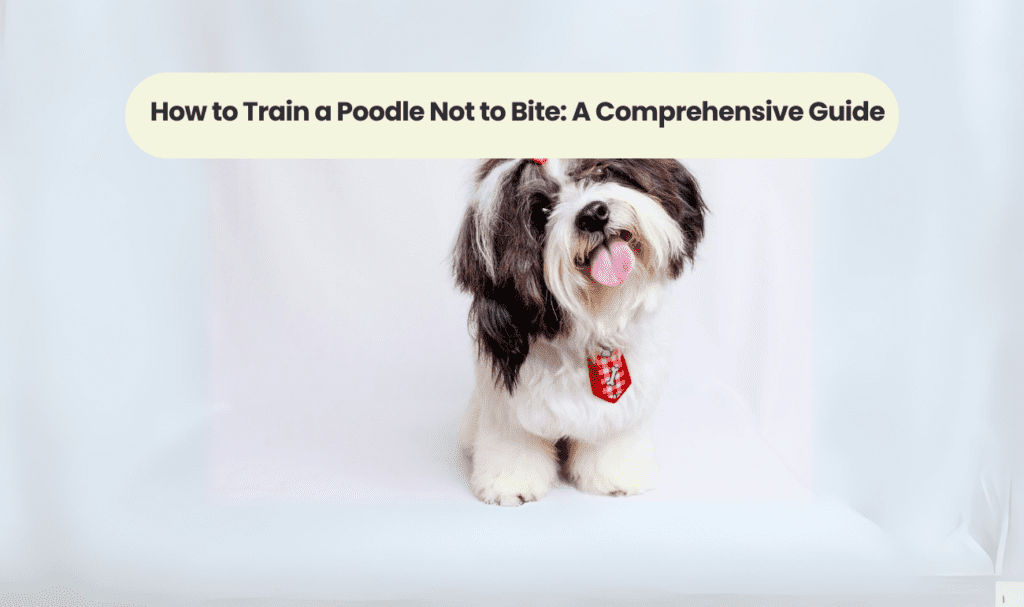Poodles are adorable and intelligent dogs, but they can have a tendency to bite, especially during their puppy stage. While this behavior may seem harmless at first, it’s important to address it early on to prevent it from becoming a habit. In this comprehensive guide, we will explore effective methods to train a poodle not to bite. By understanding the causes of biting and implementing the right training techniques, you can raise a well-behaved and gentle poodle.
- Understanding the Causes of Poodle Biting
- Teaching Bite Inhibition
- Providing Chew Toys for Teething Relief
- Proper Leash Practices
- Keeping Your Poodle Calm and Comfortable
- Anticipating Your Poodle’s Needs
- Reinforcing Positive Behavior
- Establishing Yourself as the Leader
- Avoiding Physical Punishment
- Socializing Your Poodle
- Seeking Professional Help if Needed
- Frequently Asked Questions
- Conclusion
Understanding the Causes of Poodle Biting
Before addressing your poodle’s biting behavior, it’s crucial to understand the underlying causes. Poodles, like many other dogs, may bite due to teething, curiosity, playfulness, or social interaction. Teething can cause discomfort, leading them to chew on objects, including your hands. Curiosity and playfulness often drive puppies to explore the world with their mouths. It’s essential to distinguish between harmless mouthing and aggressive biting. Before digging deeper lets see the important points:
- Socialization: Expose your Poodle to a variety of people, animals, and environments from a young age to help them become well-adjusted and less likely to resort to biting out of fear or anxiety.
- Positive Reinforcement: Reward your Poodle with treats, praise, or toys when they exhibit appropriate behavior such as licking instead of biting. Positive reinforcement encourages good behavior while strengthening the bond between you and your dog.
- Redirecting Attention: When your Poodle starts to bite, redirect their attention to a chew toy or interactive game to provide an acceptable outlet for their chewing behavior.
- Consistent Commands: Use consistent commands such as “no bite” or “gentle” to communicate to your Poodle that biting is not acceptable. Be patient and persistent with these commands to reinforce the desired behavior.
- Avoid Rough Play: Refrain from engaging in rough play with your Poodle, as it can inadvertently encourage biting behavior. Instead, opt for gentle play and discourage any biting or mouthing with a firm “no” and cessation of play.
- Timeouts: If your Poodle continues to bite despite redirection and commands, calmly remove them from the situation and give them a brief timeout in a quiet area. This helps them understand that biting results in loss of attention and playtime.
- Professional Training: Consider enrolling your Poodle in obedience classes or working with a professional dog trainer to address biting behavior effectively. A trainer can provide personalized guidance and techniques to address your Poodle’s specific needs.
Teaching Bite Inhibition
One of the first steps in training a poodle not to bite is teaching bite inhibition. Bite inhibition refers to a dog’s ability to control the intensity of its bite. You can start by imitating the natural reactions of littermates and yelp in a high-pitched tone when the poodle bites too hard. This mimics the response they would receive from their siblings, teaching them to be more gentle during play. However, be cautious as some puppies may become more agitated by this approach.
Providing Chew Toys for Teething Relief
During the teething stage, it’s essential to provide your poodle with appropriate chew toys. These toys not only divert their attention from biting hands or furniture but also offer relief for their sore gums. Opt for toys specifically designed for teething puppies, such as durable rubber or nylon chew toys. Avoid toys that resemble household objects, as this may confuse the poodle and lead to inappropriate chewing habits.
Proper Leash Practices
If your poodle tends to bite or pounce on your feet while walking, you can use a simple technique to discourage this behavior. Dangle a tasty treat near your feet while walking, redirecting their attention to the reward rather than biting. This method can also help teach your poodle proper leash manners. However, be cautious not to reward them immediately after they’ve pounced on your feet, as it may reinforce the behavior.
Also Read: How long poodle are pregnant
Keeping Your Poodle Calm and Comfortable
Stress and anxiety can contribute to biting behavior in poodles. If your dog becomes irritable, tantrum-prone, or starts biting, it may be a sign that they’re tired or overwhelmed. Providing your poodle with a calm and comfortable space, such as a crate, can help them relax and reduce biting tendencies. However, be mindful not to associate the crate with punishment, and allow them to cool down in different locations to avoid negative associations.
Anticipating Your Poodle’s Needs
Understanding your poodle’s needs is crucial in preventing biting behavior. If your poodle bites after being indoors all day, it may be a sign that they have excess energy. Regular exercise and playtime can help release their pent-up energy, reducing the likelihood of biting. Additionally, socializing your poodle with other dogs and exposing them to different experiences can help prevent biting due to fear or territorial instincts.
Reinforcing Positive Behavior
Positive reinforcement is a powerful tool in training a poodle not to bite. Whenever your poodle shows restraint, chooses a toy over biting, or plays gently, reward them with treats, praise, or extra cuddles. By associating positive behavior with rewards, your poodle will be motivated to display more gentle and non-biting behaviors. Conversely, they will learn that biting does not result in rewards and is discouraged.
Establishing Yourself as the Leader
Consistency and leadership are key when training a poodle not to bite. Establish yourself as the leader of the pack by taking control of feeding times, walking schedules, and playtime. This helps your poodle understand that you are in charge and teaches them to follow your commands. Starting this training from a young age is crucial, as it can be more challenging to instill new habits in older dogs.
Avoiding Physical Punishment
While biting can be frustrating, it’s important to avoid physical punishment. Hitting or shouting at your poodle will only increase their anxiety and may worsen the biting behavior. Instead, focus on positive reinforcement and redirecting their attention to appropriate behaviors. If you’ve tried various training methods and are still struggling, it may be time to seek professional help from a veterinarian or dog trainer.
Socializing Your Poodle
Socialization is a vital aspect of training a poodle not to bite. By exposing your poodle to various experiences, people, animals, and sounds, you can reduce biting tendencies stemming from fear or uncertainty. Enrolling your poodle in puppy classes, visiting dog parks, and arranging playdates with other dogs can help them develop proper social skills. Socialization should ideally begin between 3 and 12 weeks of age, but it’s never too late to start.
Seeking Professional Help if Needed
If your poodle’s biting behavior persists despite your efforts, it may be beneficial to seek professional help. A veterinarian or dog trainer can provide specialized guidance tailored to your poodle’s specific needs. They can assess the underlying causes of biting, develop a customized training plan, and offer additional resources to address any aggression or behavioral issues.
Frequently Asked Questions
Q: When do Poodles stop biting?
A: Poodles will not naturally stop biting unless trained not to do so. It’s important to start training them from a young age to prevent biting problems, especially as they reach adulthood.
Q: Are miniature poodles aggressive?
A: Fear-based aggression is more common in toy and miniature poodles. Proper socialization and training can help address any aggression issues and create a well-behaved and balanced poodle.
Q: Why do poodles bite?
A: Poodles may bite due to teething, curiosity, playfulness, or as a form of communication during social interaction. Understanding the reasons behind biting is crucial in addressing the behavior effectively.
Q: How can I stop my poodle from biting during play?
A: Teaching bite inhibition, providing chew toys, and engaging in constructive play can help redirect your poodle’s biting behavior towards more appropriate outlets.
Q: Is physical punishment effective in stopping poodle biting?
A: No, physical punishment is not recommended as it can increase aggression and anxiety in your poodle. Positive reinforcement and redirection are more effective approaches to discourage biting.
Q: Can I socialize an adult poodle to prevent biting?
A: While socializing puppies is ideal, it’s possible to socialize adult poodles as well. Patience, consistency, and gradual exposure to new experiences can help reduce biting tendencies and promote positive interactions.
Conclusion
In conclusion, training a poodle not to bite requires understanding the underlying causes, consistency in training methods, and positive reinforcement. By following these tips and seeking professional help if needed, you can raise a well-behaved and gentle poodle. Remember, patience and consistency are key in achieving success. Enjoy the journey of training your poodle and creating a strong bond built on trust and respect.

